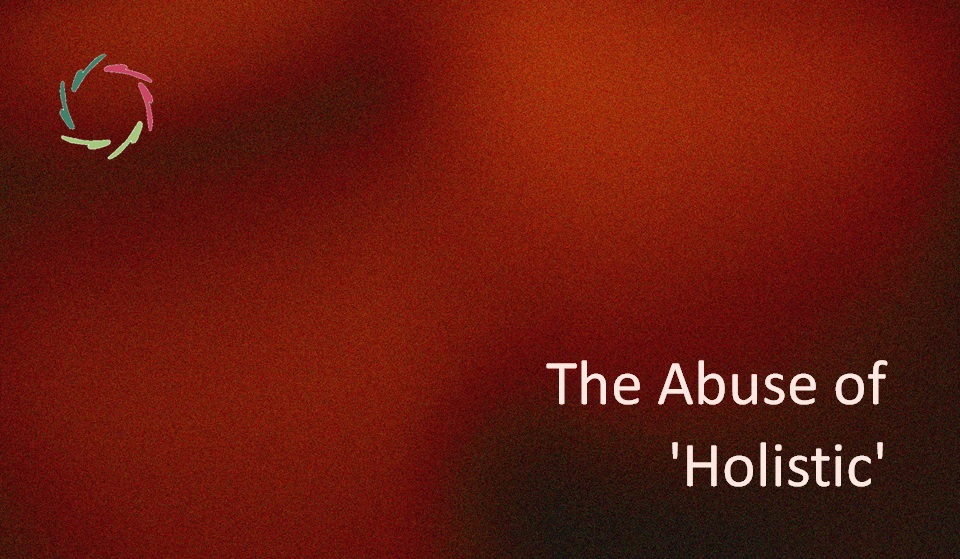The Abuse of ‘Holistic’

The term ‘holistic’ is abused very frequently, very deeply, and very inconsiderately, in many cases meaning something pretty unholistic.
A holistic approach looks at the whole person, considering his physical, mental (including emotional), social, and spiritual wellbeing. The focus lies on a person’s wellness, not just his illness. That’s a great start.
Away from pure materialism
In the Aurelian take of ‘mind=body,’ it all depends on the viewpoint. Therefore, one can say that everything is material. Even so, the term ‘materialistic’ commonly means that the mind – let alone deeper self – is of little to no importance. The first step away from pure materialism is a good start.
However, shifting away, it also matters where one may be shifting towards. In the holistic universe (mainly New-Age), I see little criticism in where the shifting goes to. It’s as if the common enemy – or ‘the other side’ at least – is generally reason enough to stick together – as it usually goes – and to proceed in a severe lack of skepticism. In this vein, manipulation awaits you around every corner. This is already a good reason to hold onto rational thinking.
Holistic medicine, including anything
This frequently involves alternative medicines without regard to science. When time after time, scientific proof is sought but not found or easily debunked, a specific direction should get lower esteem. More than enough, this doesn’t happen in holistic medicine.
On top of this, many weird explanations for proposed effectivity are brought without credible sources or fundament and with a distinctive smell of placebo-based medicine.
Since many people eagerly seek magic, this is what easily gets success in such a domain.
Thus, ‘holistic’ seldom delivers its promise.
Straightforwardly, it doesn’t transcend materialism but gives it a different flavor, especially in the – global – West.
For instance, acupuncture may have started with a considerable degree of poetry ― not anymore in the Western take with steel needles, to-be-found meridians, and an energy that influences matter just like any other materialistic kind of energy.
For instance, homeopathic remedies may contain less than one molecule of ‘active substance’ per bathtub. Still, according to homeopathic theories, the influence goes from material substance to substance.
I don’t see the transcendence of pure materialism in these examples, nor chiropractic or osteopathic medicines, nor others. Everywhere, I see matter-to-matter.
Essentially
In body-mind duality, the body itself is seen as a purely materialistic thing that may be influenced by the ephemeral mind ― but how?
This not properly answerable question already shows the vainness of any endeavor to keep the duality and the holistic goal together. That is also the primary reason why many of these endeavors quickly go astray.
Yoga, meditation
These are special cases, coming in many guises. Western ones are frequently pretty body-oriented, using the mind towards attending to body and mind as separate entities. This comes close to the above description of ‘holistic’ without abuse.
Traditionally, yoga is the path of body postures striving towards the bodily state most conducive to meditation, being the one main goal. But, of course, meditation itself also comes in many guises. The most interesting ones are, well, pretty universe-oriented. The body is a means that brings you to some point at which it may as well be forgotten. One may call the universal aim ‘holistic.’ Still, there is little to be found here that accords with our body=mind endeavor.
In deepening meditation, one might meditate upon this endeavor, then get beyond, and notice.
It is tough to get beyond pure materialism.
To do so, one needs to go beyond body and mind as we know it ― them being separate entities.
There is probably only one way ― simultaneously the most poetic and the most scientific.
This is still challenging for many people since it puts in the balance many cherished certainties about life and death and the sense of everything. There are answers to many questions on these domains, but they demand deep daring.
I think you’ve got what I mean.


